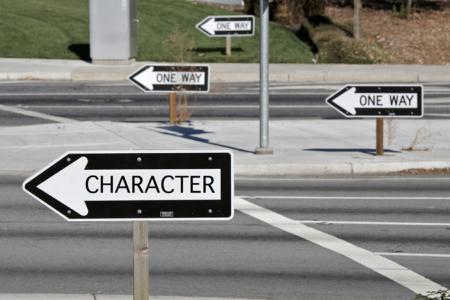What do St. Augustine, Eisenhower, Dorothy Day and Samuel Johnson have in common?
The answer is... But, wait! First, another question. Actually, a few of them. Personal questions. What is your most valuable personal possession? Something you have now and will continue to have? Something you have made and something you can change, improve or destroy? Something that you are known for?
If you answered, your stock portfolio or your 401k, well, you are way off. If you said your family, an interesting answer, but only partial credit. If you answered, your spouse, you should quickly re-enroll in Pre-Cana or a marriage enrichment program.
Hint. The answer is a "c" word. No, not "cash" or "car" or your "comforts." It is character, as in "your character."
Character is much out of fashion these days. Once highly prized and nurtured, it has been replaced. Our current society values skills, intelligence, accomplishments, possessions, good looks and style. However, scratch a serious mother or father and ask what quality they most want their child to develop and the answer is a good character. Ask those same individuals for what they personally most want to be remembered, and you hear the same answer. This sense is captured by the hospital chaplain who claimed he never heard a businessman on his death bed lamenting that he had spent too much time with his family and not enough time at the office.
Our most valuable possession is our character, the sum of all our habits, good and bad, our virtues and vices. (More out of fashion words.) Our characters are usually better known by the people around us who regularly observe the way we act, the way we respond to events. "Old Harry always thinks of himself first." "Sally never has an unkind word about anyone...even old Harry!" "When something goes wrong, steady George is the first to react and take responsibility." Each of us is marked by our habits.
The answer, then, to our question is that these four individuals named in the title of this piece and their characters are the subjects of a new and highly readable book, "The Road to Character." The author is David Brooks, the New York Times columnist and media commentator. The book begins with a vivid and forceful critique of contemporary culture and describes how American civil society -- which once supported and reinforced virtues such as self-control, personal discipline and concern for others -- now encourages and rewards a focus on self and personal achievement.
The bulk of Brook's book is eight case studies of well-known individuals who, though not perfect people, forged strong characters. Most representative is Dorothy Day of The Catholic Worker, who currently is being considered for sainthood. Day's early life, and continuing well into her 20s, was a mess. She drank excessively, had passionate affairs and an abortion. Finally, having a daughter and finding the Catholic faith gave her the motivation to forge her character. She spent the remainder of her life in lower Manhattan living a life of poverty, but working daily to feed and clothe the poor.
Brooks refers to this as the shift from peoples' concern from their potential "resume" values to their "eulogy" values. In the past, people were mindful how their family and neighbors would think about them at their death, what would be said about them at their funerals. Today, we are preoccupied with our resumes. We are clearly more committed to building our external careers than on building the habits of inner character. We have even lost the vocabulary of character and the moral life.
While for centuries there has been tension between the realistic and the romantic views of the person, now one side is dominant. The realist view, one that is very much part of the Catholic tradition, is that man is conceived in sin. We inherit a flawed nature, but through grace and our own hard work we are saved. Brook's echoes the philosopher, Emmanuel Kant, who claims people come into the world as "crooked timber."
As an aftermath of World War II, the romantic view of mankind, which focuses on our "inner goodness," received a huge boost. Self-restraint and personal sacrifice were downgraded. Popular psychologists, such as Carl Rogers and Dr. Joyce Brothers, introduced movements toward self-actualization and self-esteem, themes that were picked up and extended by many religious leaders. Schools relaxed attention to teaching self-discipline, and many of the virtues which traditionally have been the glue of our society.
While Brooks is Jewish, his view of the moral life is quite in line with Catholic doctrine. He writes of sin and redemption and prayer. Writing about Dorothy Day's daily heroism working with the poor, he says she was not only a champion of Catholic social thought, but a concrete living example.
Brooks goes on to write, "Catholic Social teaching is based in part, on the idea that each life has equal dignity, that the soul of a drug-addled homeless person is just as invaluable as the most laudable high achiever. It is based on the conviction that god has a special love for the poor."
He has a surprisingly Catholic message. Except for one major point: He doesn't have a compelling answer to the very real world question, "Why be good?" In a wholly material world without God and one oozing with temptation, why not grab all the pleasure we can? Brooks' answer cannot embrace a God-centered existence. Instead he settles for moments of "aesthetic joy." "There's joy in a life filled with interdependence which others, in a life filled with gratitude, reverence, and admiration." Yes. Perhaps, and perhaps not. Nevertheless, this uncertain answer is thin gruel compared with union with God in the afterlife.
KEVIN AND MARILYN RYAN, EDITORS OF "WHY I'M STILL A CATHOLIC," WORSHIP AT ST. LAWRENCE CHURCH IN BROOKLINE.
- Kevin and Marilyn Ryan, editors of "Why I'm Still a Catholic," worship at St. Lawrence Church in Brookline, Mass.



















